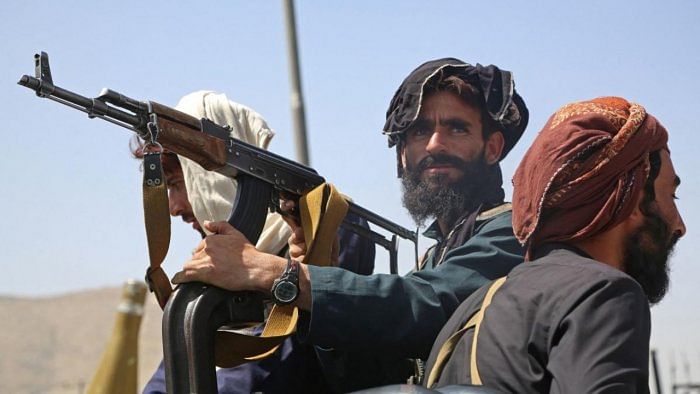
India’s worst fears have come true in Afghanistan. Having assiduously worked to safeguard its vital strategic interests in the landlocked country, its swift takeover by the Taliban has upended New Delhi’s stratagem for a friendly ally in the neighbourhood.
For now, New Delhi finds itself out in the cold, forced to play the wait-and-watch game on the margins as an Afghanistan in turmoil heads towards becoming an Islamic Emirate, with more than gleeful support from Pakistan and China.
With the US’ abject abdication and withdrawal of military forces from Afghanistan, all that New Delhi can do now is to watch the unfolding political machinations as the Taliban prepares to form a government.
In remarks before the UN Security Council, India has said it hopes for an “inclusive dispensation” and that a “broader dispensation would help the arrangement gain more acceptance and legitimacy”. India will throw in its lot with the “democratic bloc” when it comes to taking a decision on whether it should recognise the Taliban regime.
But it won’t be an easy call for New Delhi to take, having thus far desisted from actively engaging with the Taliban, though there have been a few reports of backchannel talks with the radical outfit. But for now, India has few options if it is to remain a stakeholder in a nation going through yet another cycle of strife and turmoil.
Pakistan has systematically been working against Indian interests in Afghanistan and the region for long. Given the deep animosity the GHQ Rawalpindi and ISI harbour towards India, they have made determined efforts over the years to limit India’s role in Afghanistan while providing safe havens to the Taliban and hoodwinking the US.
New Delhi’s worries have increased manifold now that the Taliban, nurtured by the Pakistani deep-state, is back in the saddle. Pakistan PM Imran Khan went so far as to say Afghanistan has finally broken the “shackles of slavery” now.
With relative stability on its eastern borders in the months ahead, Pakistan might well step up its efforts to foment further trouble in Kashmir on its west. Pakistan-based terror outfits such as the Lashkar-e-Taiba (LeT) and Jaish-e-Mohammed could use Afghanistan as a base to plan strikes in Kashmir.
This lurking fear of jihadi groups getting a fillip and fuelling terrorism in countries in the region has already made India voice concerns in a statement before the UN Security Council a day after the Taliban captured power.
“If there is a zero-tolerance for terrorism in all its forms and manifestations, and it is ensured that the territory of Afghanistan is not used by terrorist groups to threaten or attack any other country, then Afghanistan’s neighbours and the region would feel safer,” said T S Tirumurti, India’s Permanent Representative to the UN.
The increasing role of Pakistan in Afghanistan will not be the only cause for Indian anxieties. It also needs to watch out for China’s moves in Afghanistan, which could include bankrolling the Taliban and getting access to the rich resources in the country.
India-China ties have taken a nosedive after the ongoing military confrontation in eastern Ladakh since April-May last year. Moreover, India’s pronounced US-tilt as the two work to isolate China through the `Quad’ and others in the Indo-Pacific region has left Beijing seething. Afghanistan presents China and Pakistan with an opportunity to strike back together to shrink India’s strategic space in the neighbourhood.
There’s another worry for New Delhi. The Afghan government’s ouster could well mean a setback for the development of the strategic Chabahar port in Iran. The Iranian port is seen as a vital connectivity project giving landlocked Afghanistan access to the sea. For India, the port enables it to bypass Pakistan to access Afghanistan and Central Asian countries.
While the Chabahar project has taken some hits due to US sanctions on Iran, India has remained steadfast in its resolve to develop it. The port’s Shaheed Beheshti terminal has been used for transshipments between India and Afghanistan.
Over the last two decades, India has also invested a lot of money and resources into infrastructure building in Afghanistan, pouring nearly $3 billion into it by way of development assistance.
Unlike President Joe Biden’s breezy explanation since the Taliban takeover that the US mission in Afghanistan “was never supposed to have been nation-building” or creating “a unified, centralised democracy”, India’s messaging has been very different.
India has always held that it’s there to assist the Afghans in their nation-building efforts with assistance for infrastructure projects and military aid and training of thousands of military personnel. And that it was there for the long haul, undertaking major projects such as the Salma dam, Afghan Parliament and the 218-km long Zaranj-Delaram highway over the years.
But the best-laid plans can come undone. For now, India can only watch the new Great Game from the sidelines. And for all those with fanciful notions that the return of the Taliban in Afghanistan will see it become more moderate this time, they are living in a make-believe universe. Let’s not forget that the current Taliban chieftain Haibatullah Akhundzada is considered much more of a conservative hardliner than Mullah Mohammed Omar ever was in the 1990s.
(The writer is a senior New Delhi-based journalist)
Disclaimer: The views expressed above are the author’s own. They do not necessarily reflect the views of DH.